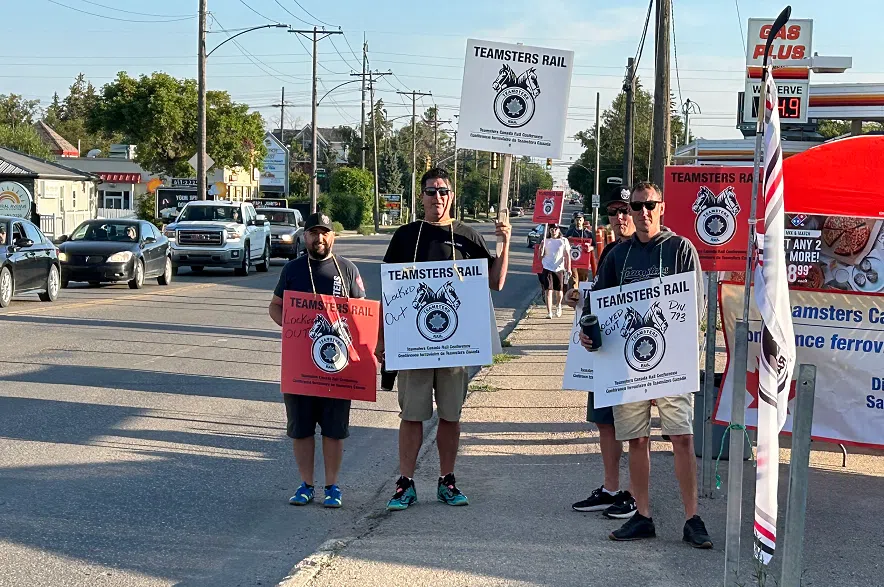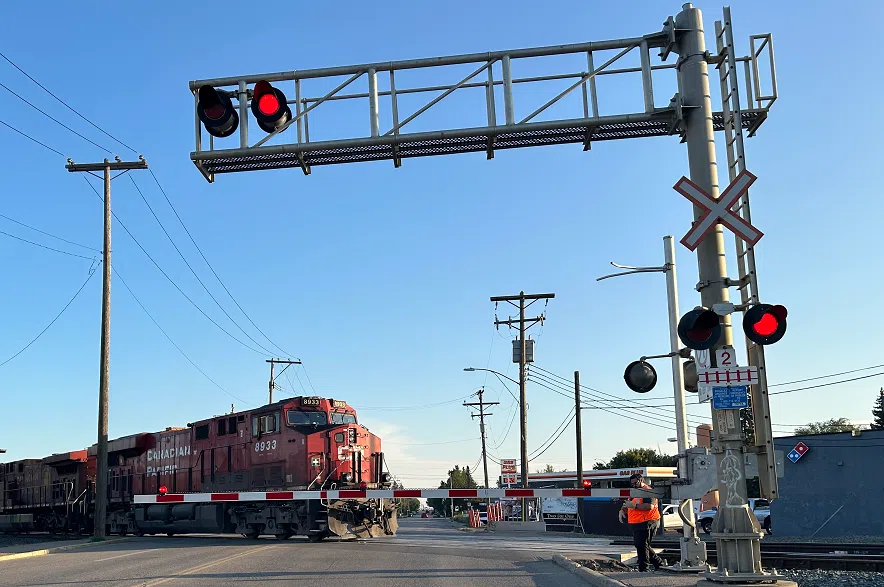Just hours after Canadian Pacific Kansas City locked them out of their workplaces, many rail workers were out on the picket lines early on Thursday morning in Saskatoon, pleading for the union and company to get a deal done.
After months of difficult negotiations, Canadian National Railway Co. and Canadian Pacific Kansas City Ltd. locked out 9,300 engineers, conductors and yard workers after the parties disagreed on a new contract before the midnight deadline.
The lockout means big issues for freight traffic on Canada’s two largest railways, and Saskatchewan’s provincial government has previously called on Ottawa to intervene, in order to avoid the potential for major damage to the provincial economy.
“We don’t want to be here,” said Trevor Sanders, the president of Teamsters Local 793, the union representing the rail workers in the city.

Teamsters began picketing in Saskatoon on Thursday morning after CN and CPKC locked out workers. (Shane Clausing/650 CKOM)
“We want to be working. We want to be moving the product for the farmers, and we want to be out here. This is the last resort, and this is not where we want to be right now. We wish the company would sit down with the union and hash out a deal.”
More than 100 Canadian Pacific Kansas City employees work at the rail yard in Saskatoon’s Sutherland neighbourhood.
Jared Matteis, chairman of the Teamsters Local 793, said the company is asking for major concessions from its workers. Matteis said the changes would make it harder for workers to predict their schedules in advance, which could lead to fatigue-related risks.
READ MORE:
- Potential rail strike threat hanging over Saskatchewan harvest
- Sask. could lose hundreds of millions if rail strike happens
- Trudeau says government will have update shortly on solution to rail lockout
“They’re also pushing for major reductions in certain pay claims,” Matteis added.
Sanders echoed the concerns of provincial and agricultural leaders, saying that the impacts of the work stoppage go far beyond just those working on the rail lines.
“It’s scary,” he said. “The economy is in a difficult position right now, and this is difficult for everyone, including ourselves. It hurts everybody.”

Jared Matteis, chairman of the Teamsters Local 793, said the rail lockout will affect all Canadians. (Shane Clausing/650 CKOM)
On Thursday morning there were still some trains moving at the rail yard. Sanders said the people running the trains were managers, who are not under the same union as the workers.
“They’re not union. They’re different. They don’t have collective agreement, and their rules are different,” he explained.
Politicians throughout the country are calling on both sides to come to terms on a new deal. Sanders said the workers also want a deal done right away.
“I hope a deal gets done immediately; as quick as possible. We want this over with. We want to get back out there moving the product out for Canadians,” he stated.
“This is the last thing we want. We want the public to know this is not our decision – we want to be working.”
Bill Prybylski, vice president of the Agricultural Producers Association of Saskatchewan, said this week that Saskatchewan producers are very reliant on rail transport during harvest.
“A lot of producers are counting on selling some grain right off the combine to pay some bills or make mortgage payments,” Prybylski said. “As producers, we don’t get paid until we’re able to actually deliver the grains to the elevators.”
Prybylski said 94 per cent of what Saskatchewan producers grow is transported by rail. If deliveries from the province are delayed, he said valuable trade relationships could be damaged.
“If we got ships waiting at the ports to accept Canadian grains to go to our export customers, and that grain isn’t showing up, those customers may go elsewhere,” said Prybylski. “They need their grains to feed their people, so if they can’t get it from Canada, they’ll go elsewhere.”
Jeremy Harrison, Saskatchewan’s minister of trade and export development, said the stakes are high enough that Ottawa should get involved directly.
“This will be catastrophic economically,” said Harrison. “The federal government needs to step in on this. They have the tools. They have the authority.”
–with files from 650 CKOM’s Will Mandzuk and The Canadian Press











